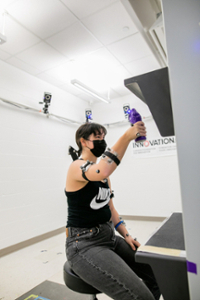Are muscle activation ratios associated with scapular kinematics during functional tasks?
Study Description

Shoulder musculoskeletal disorders (MSDs) are the second most common injury in Canada. Further, over half of all shoulder MSDs are repetitive strain injuries, meaning that they develop over time. Often, these injuries develop in part to harmful movement strategies. The most common shoulder injury is subacromial pain syndrome (SAPS). Select movement and muscle activity alterations are associated with the SAPS.
It is currently hypothesized that overactivity of the upper trapezius not balanced by sufficient activity in the serratus anterior or lower trapezius is responsible for harmful changes in movement patterns. However, this activation relationship has not been tested in functional movements, only single plane arm elevation.
There is also research needed to address this potentially harmful muscle imbalance. Some evidence suggests that targeted scapular rehabilitation can change scapular motion and muscle activation, but work remains to determine if there are meaningful effects on functional movement. Before a longitudinal study can be pursued, acute effects of training to alter muscle activation during functional movement is needed.
The primary purpose of this study is to compare upper trapezius/lower trapezius and upper trapezius/serratus anterior activation ratios during a functional task protocol before and after acute lower trapezius activation exercises. The secondary objective is to define the relationship of scapular kinematics and the above mentioned activation ratios during the functional task protocol.
How to Get Involved
We are looking for adults between the ages of 18 and 30, with no shoulder or neck pain, to participate in this research!
As a participant, you would be asked to complete a number of arm-focused tasks while your motion is tracked in our lab on the University of Saskatchewan campus.
